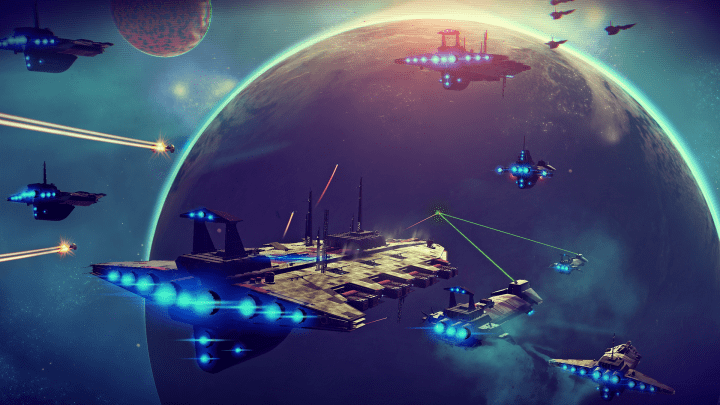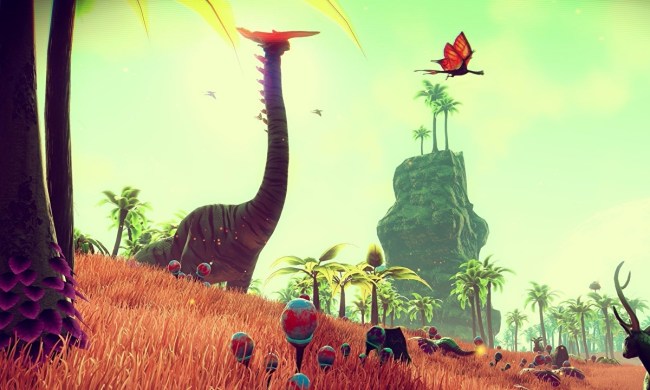
How do you create the soundtrack for a universe you’ve never seen?
No Man’s Sky, the highly anticipated space exploration adventure — at least in theory — is too big for a traditional video game soundtrack. Though there are a handful of hand-made touches, most of No Man’s Sky is procedurally generated. The vast majority of its 18 quintillion planets were designed by an algorithm, not people. The game is so vast that its developer, Hello Games, has only seen a fraction of what it has to offer.
Rather than try to make some music to fit into a world and the scenarios players will get themselves into as they explore the cosmos, sight unseen, Hello Games has extended its procedural design tactics to its soundtrack. 65daysofstatic, an electronic band based in Sheffield, U.K. teamed up with Paul Weir, the game studio’s audio director, to create a vast library of sounds and musical elements. By combining these elements, the game sets players’ experience to music in real time, based on their individual experiences.
The goal of all this extra effort — and according to both Weir and 65daysofstatic guitarist Joe Shrewsbury, it is much more work than just recording tunes — is that the music of No Man’s Sky feels more closely connected to the game than a traditional soundtrack ever could. No matter how well it fits, a single song generally pairs best with a specific moment. Players rarely experience gaming moments, even scripted ones, exactly the same way. Since the music of No Man’s Sky literally mirrors your exact actions — not what you should be doing, but what you are doing — it has the potential to enhance the game’s emotional impact in a whole new way.
Moving to the beat of the universe’s “pulse”
To do this, Hello Games Audio Director Paul Weir created a dynamic sound generation tool called “pulse,” which allows the game to combine different musical elements and create what he calls a “Soundscape,” a dynamically generated variation on the game’s core soundtrack.
“Most of the time you’re not hearing the album at all. You’re hearing these different reflections, different interpretations of [it].”
“It’s really a way of organizing lots of small, granular bits of sound [and] music components, and imposing a bit of structure and logic and control on top of them,” Weir said. “We can define how they’re combined when they’re played in the game, and attach them to game parameters so that, depending on either what you’re doing or where you are in the game, it could be calling different bits of music. It’s combining individual small elements, so the exact mix of what you’re getting and how that plays will be different every time you play.”
Pulse pulls together hundreds of sounds to make each soundscape, which are tagged by key, tempo, instrument, tone, and a litany of other distinguishing factors, to match what’s going on in the game. During solitary, exploratory moments, it will compile some slower, relaxed music, and the tempo will pick up when you’re more active or in danger.
“If you start to walk toward a building, we will often start to introduce more melodic phrases — I think it’s fairly seamless — and what variations of the melodies will play, obviously, is randomized,” Weir said.
In addition to separately recording an actual soundtrack album, 65days also worked with Weir to help produce the musical components that Pulse uses to generate the game’s dynamic music. In addition to sounds extrapolated from the soundtrack itself, the band went back into the studio and worked with Weir to create unique sounds that might not fit into a conventional song, but make sense in a soundscape. For example, Shrewsbury suspended a guitar horizontally and attached an EBow, an electronic pick that vibrates strings, to activate strings in ways you never could by hand.
The guitar on the “Red Parallax” song on the album is a blend of somebody actually fretting the guitar with that. It’s mixed with someone normally playing the guitar so it doesn’t sound as unique … but it has that otherworldly whine to it.
One soundtrack, but an infinite number of scores
Though Weir used the Pulse program to set the game’s soundscapes, the game’s overall vibe is derived from a single body of work, 65daysofstatic’s No Man’s Sky soundtrack. The album, which is what you’ve heard in the game’s many trailers (and can listen to on Soundcloud), doesn’t actually make many appearances in the game. Instead, it serves as more of a music bible — a body of work from which the game’s generated music takes its cues.
“Although you get sections of the album at key events, most of the time you’re not hearing the album at all,” Weir said. “You’re hearing these different reflections, different interpretations of what you’ll get on the album.”
“One of the things we realized we were doing early on was soundtracking the scale of the game.”
Though it seems counter-intuitive, when Hello Games brought 65daysofstatic on board, he told the band not to try and write something that sounded like a video game or a soundtrack. “They said, ‘we want the next 65days record,’” Shrewsbury recalled.
As it turns out that 65daysofstatic, or “65days,” had started inspiring Hello Games before they were even involved with game. According to multiple accounts, Hello Games chief Sean Murray was playing the band’s prior work for the team to help them define the game’s tone in the early days of development.
Just like the generative music, the soundtrack was also created largely sight unseen. The band had only seen the game a handful of times before launch, according to Shrewsbury, and didn’t get to play it for an extended period of time until after the soundtrack was already finished.
“We saw a little more than the general public,” Shrewsbury said, “but not a whole lot more.”
Instead of making sounds to fit the game’s sights, the members of 65days immersed themselves in science fiction books and films. From what they saw and what they knew about the game, they focused the notion that exploring the universe alone would probably an incredibly beautiful, but also incredibly lonely experience.
Weir, a veteran sound engineer, also created soundscape elements and original music for the game. Interestingly, where Shrewsbury and company focused more on the melancholy elements of space travel, while Weir said his contributions skewed positive, both he and Shrewsbury said the soundtrack is meant to emphasize the game’s massive scope and scale.
“One of the things we realized we were doing early on was soundtracking the scale of the game, not the linear journey, but the size of the game,” Shrewsbury said. “The journey, for the player, is so unique and you have no access to what it’s going to be in advance of that.”
And really, neither do we.
As of today, No Man’s Sky is available on PS4, and launches on PC August 12.


